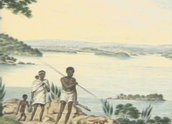

Mabo: An Address to the Nation (1993)
Synopsis
On 15 November 1993, Australian Prime Minister Paul Keating addresses the nation on his government’s response to the High Court Mabo decision which recognised native title for Aboriginal and Torres Strait Islanders. Outlining the history of the Mabo court case and referring to the many injustices affecting Indigenous Australians since European settlement in 1788, Keating states there is no correct moral or political decision other than to accept the High Court ruling. He discusses the guiding principles of legislation his government will introduce.
Curator’s notes
Mabo v Queensland (No 2) is one of the most significant court cases in Australian history. Delivering its decision on 3 June 1992, the High Court of Australia effectively extinguished the notion of terra nullius (land belonging to no-one) that had been in force in Australia since British colonisation in 1788.
The principal figure in the case was Eddie Mabo (1936–92), a member of the Meriam people from Murray Island in the Torres Strait Islands. Mabo’s campaign, supported by fellow Meriam people David Passi and James Rice, began in 1982 with a claim that Murray Islanders held title to their land by virtue of long and continuous occupation and deep connection to their home.
In the year after the High Court found in favour of Mabo and effectively rewrote Australian common law, then prime minister Paul Keating delivered this nationally televised address on the significance of the Mabo decision. He also gave details of the legislation his government had prepared in response.
A combination of history lesson, policy statement and call for national unity, Keating’s speech unequivocally supports the High Court decision in both legal and moral terms. The use of paintings and archival photographs in the early part of his speech (see clip one) firmly presses the point that Mabo is a moral issue Australia must act upon. The terrible treatment of many Indigenous Australians over many years is highlighted and shown to be drastically at odds with the treasured Australian ideal of a tolerant society in which everyone is entitled to a 'fair go.’
In the second half of his speech, Keating’s language is less emotional, more practical. He says the current generation of Australians should not assume guilt for past wrongdoing, but should look forward to the societal benefits Mabo offers. Providing an overview of how the Mabo legislation will work, he is very careful to allay fears landowners might have of property being seized and businesses facing uncertainty. While acknowledging not everyone will be completely satisfied with the legislation (see clip two), Keating stresses the importance of formally recognising native title and ensuring that Mabo-driven legislation will work in the national interest (see also First Australians – Episode 7, We Are No Longer Shadows, 2008).
Drawing attention to the need for federal control over land rights laws, he criticises the Western Australian state government for its plan to implement its own policies.
It is rare for Australian prime ministers to make televised addresses to the nation. Paul Keating judged this particular issue to be of sufficient importance to warrant such an action. He is persuasive and clearly deeply committed to the path his government plans to pursue.
In the words of politicians, this speech can be seen as a ‘nation building’ moment. Eddie Mabo, whose surname has since become synonymous with all aspects of native title, passed away just six months before the High Court decision. Successive Australian federal governments have honoured both the High Court decision and the Keating administration’s legislation, which became the Native Title Act 1993.
Mabo: An Address to the Nation was broadcast on Australian television on 15 November 1993.
Secondary curator’s notes
by Liz McNivenIn this historic speech, the Honourable Prime Minister Hon PJ Keating MP formally responded to the High Court of Australia’s rejection of the terra nullius doctrine and its recognition of the existence of native title. Commending the High Court’s decision, he states in the introduction, ‘The court’s decision was unquestionably just; it rejected a lie and acknowledged the truth’.
Keating used this televised address to the nation to frame the native title debate within the parameters of the impending federal government legislation; to allay the fears of Australians, mining companies and other industry groups; and to purport some form of justice for Aboriginal people. He explains, ‘We owe it to Aboriginal Australians, to all Australians, indeed we owe it to our fair and democratic traditions and to future generations, to recognise native title’.
In this broadcast, Keating identifies native title as an ‘issue the country could not ignore, either legally or morally’ and explains to the Australian people that there is now ‘another form of title that has to become part of the way we manage land in Australia’.
With a strong argument supporting the recognition of native title rights, Keating announces that his government’s legislation will enact a single uniform national approach. He explains it will include the right to negotiate but not the right of veto in relation to activities occurring on lands held under native title.
He reassured Australians of the safety of their tenure in suggesting that the only land available for claim would be vacant Crown land and implying the only people likely to have maintained their native title since colonisation would be people living in remote parts of the country.
This recording opens and closes with the image of a beautiful watercolour, 'Fishing by Torchlight’, painted by convict artist Joseph Lycett (born c1774). It also uses other 19th century Australian paintings and some early photographic images of Aboriginal peoples and cultures. These images imbue this political speech with sentiment and meaning. They take the viewer back in time to the place where it all began and provide context to a unique and interesting presentation.
- Overview
- Curator’s notes
- Video 2 clips
- Principal credits
- Find a copy
- Make a comment
- Add your review




